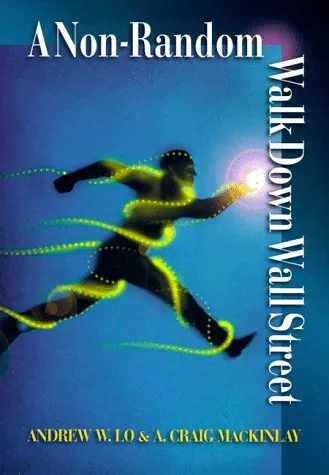A Non-Random Walk Down Wall Street
4.5
Reviews from our users

You Can Ask your questions from this book's AI after Login
Each download or ask from book AI costs 2 points. To earn more free points, please visit the Points Guide Page and complete some valuable actions.Introduction to 'A Non-Random Walk Down Wall Street'
'A Non-Random Walk Down Wall Street' is a seminal work authored by Andrew W. Lo and A. Craig MacKinlay, which challenges the traditional view of efficient markets and the random walk hypothesis. This book is a quintessential read for anyone keen on understanding market dynamics beyond conventional financial theories. By meticulously dissecting the assumptions underlying the Efficient Market Hypothesis (EMH), the authors offer profound insights into the complexities of financial markets through empirical evidence and statistical analysis.
Detailed Summary of the Book
The book delves deep into the fabric of financial markets, carefully analyzing the notion that security prices move randomly, a cornerstone of the Efficient Market Hypothesis. Through rigorous research and comprehensive data analysis, Andrew W. Lo and A. Craig MacKinlay demonstrate that markets do not always behave randomly. By exploring anomalies and patterns that could suggest predictability, the authors argue for the existence of inefficiencies in markets that can be exploited.
The text discusses several methodologies employed in the analysis of financial data, including statistical techniques and mathematical models, to identify these patterns. These methodologies challenge the random walk theory, suggesting that past stock prices, trading volumes, and other financial indicators can provide valuable information about future market behavior. The authors bring together various studies documenting the predictability of stock returns, emphasizing that the random walk theory is not as robust as traditionally believed.
Key Takeaways
- Financial markets exhibit patterns and anomalies that can be systematically analyzed and understood.
- The Efficient Market Hypothesis is challenged through empirical evidence showing predictability in stock returns.
- Statistical and mathematical tools are crucial for uncovering significant insights into market behavior.
- Understanding market inefficiencies can lead to more effective investment strategies.
Famous Quotes from the Book
"If stock prices are governed by a random walk, then attempts to predict their future movements are useless."
"Empirical evidence strongly suggests that markets exhibit momentum effects which violate the efficient markets paradigm."
Why This Book Matters
'A Non-Random Walk Down Wall Street' matters because it offers a paradigm shift in understanding market behavior, breaking away from traditional theories. For academics, professionals, and investors, this book provides invaluable perspectives on market predictability and efficiency. It arms readers with knowledge that challenges the status quo, encouraging a rethink of investment strategies grounded solely on the random walk hypothesis. By unraveling the complexities of market dynamics, this book not only questions existing financial doctrines but also lays the groundwork for future exploration and innovation in financial analysis and investment strategy.
Free Direct Download
You Can Download this book after Login
Accessing books through legal platforms and public libraries not only supports the rights of authors and publishers but also contributes to the sustainability of reading culture. Before downloading, please take a moment to consider these options.
Find this book on other platforms:
WorldCat helps you find books in libraries worldwide.
See ratings, reviews, and discussions on Goodreads.
Find and buy rare or used books on AbeBooks.
1323
بازدید4.5
امتیاز50
نظر98%
رضایتReviews:
4.5
Based on 0 users review
"کیفیت چاپ عالی بود، خیلی راضیام"
Questions & Answers
Ask questions about this book or help others by answering
No questions yet. Be the first to ask!


